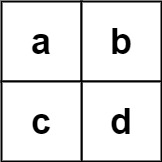213. House Robber II
You are a professional robber planning to rob houses along a street. Each house has a certain amount of money stashed. All houses at this place are arranged in a circle. That means the first house is the neighbor of the last one. Meanwhile, adjacent houses have security system connected and it will automatically contact the police if two adjacent houses were broken into on the same night.
Given a list of non-negative integers representing the amount of money of each house, determine the maximum amount of money you can rob tonight without alerting the police.
Example 1:
Input: [2,3,2] Output: 3 Explanation: You cannot rob house 1 (money = 2) and then rob house 3 (money = 2), because they are adjacent houses.
Example 2:
Input: [1,2,3,1] Output: 4 Explanation: Rob house 1 (money = 1) and then rob house 3 (money = 3). Total amount you can rob = 1 + 3 = 4.
1 2 3 4 5 6 7 8 9 10 11 12 13 14 15 16 17 18 19 20 21 22 23 24 25 26 27 28 29 30 31 32 33 34 35 36 37 38 39 40 41 42 43 44 45 46 47 48 49 50 51 52 53 54 55 56 57 58 59 60 61 62 63 64 65 66 67 68 69 70 71 72 73 74 75 | //C++: 0ms alg1 class Solution { public: int robL(vector<int> &num, int start) { int n = num.size(); int dp[1000] = {0}; if(start==0){ for(int i=2; i<=n; ++i){ dp[i] = max(dp[i-2]+num[i-2], dp[i-1]); } return dp[n]; }else{ for(int i=3; i<=n+1; ++i){ dp[i] = max(dp[i-2]+num[i-2], dp[i-1]); } return dp[n+1]; } } int rob(vector<int>& nums) { int n = nums.size(); if(n==1) return nums[0]; return max(robL(nums, 0), robL(nums, 1)); } }; //C++: 0ms alg2 constant space class Solution { public: int rob(vector<int>& nums) { int n = nums.size(); if(n==0) return 0; if(n==1) return nums[0]; if(n==2) return max(nums[0], nums[1]); int p10 = nums[0], p20 = max(nums[0], nums[1]), pw0 = p20;//starting from 0 int p11 = nums[1], p21 = max(nums[1], nums[2]), pw1 = p21;//starting from 1 for(int i=2; i<n; ++i){ if(i<n-1){//include nums[0], cannot include nums[n-1] pw0 = max(p10+nums[i], p20); p10 = p20; p20 = pw0; } if(i>2){//not include nums[0] pw1 = max(p11+nums[i], p21); p11 = p21; p21 = pw1; } } return max(pw0, pw1); } }; //Java class Solution { public int rob(int[] nums) { int n = nums.length; if(n==0) return 0; if(n==1) return nums[0]; if(n==2) return Math.max(nums[0], nums[1]); return Math.max(helper(Arrays.copyOfRange(nums, 0, n-1)), helper(Arrays.copyOfRange(nums, 1, n))); } int helper(int[] nums){ System.out.println(Arrays.toString(nums)); int a = nums[0], b = Math.max(a, nums[1]); int i = 2; while(i<nums.length){ int t = Math.max(a+nums[i++], b); a = b; b = t; } return b; } } |

